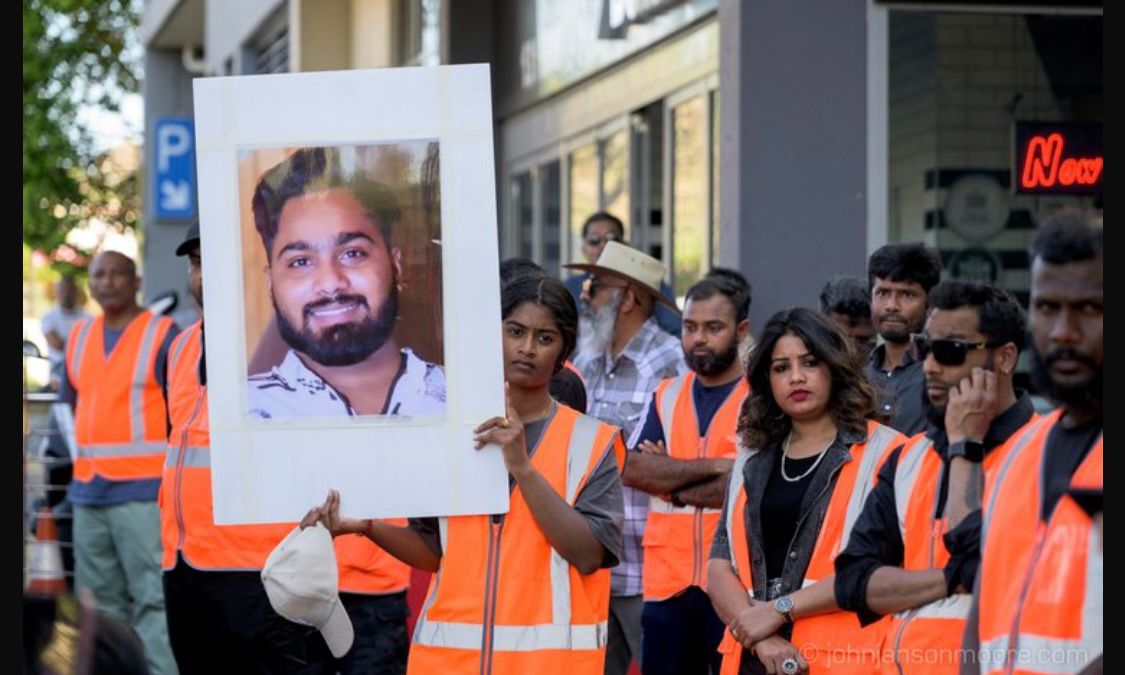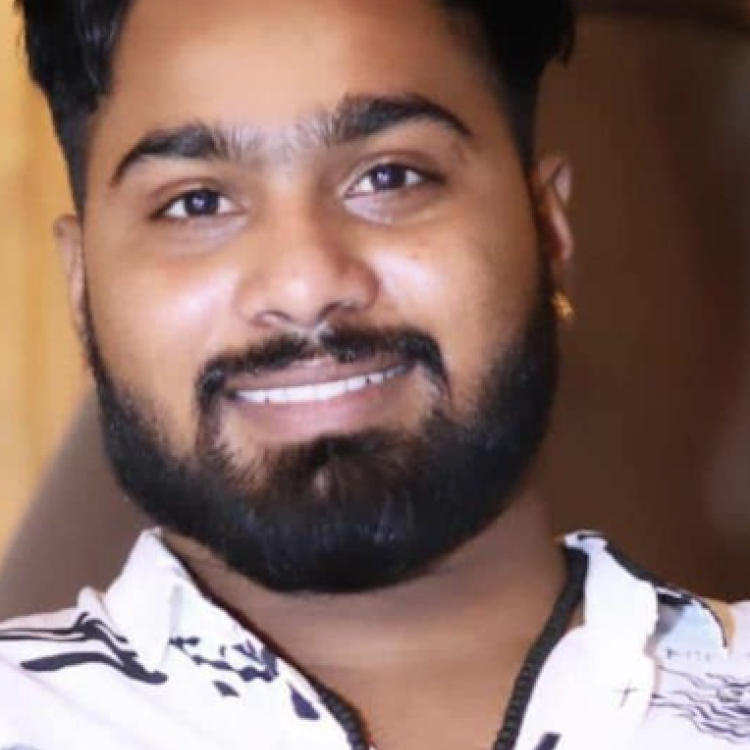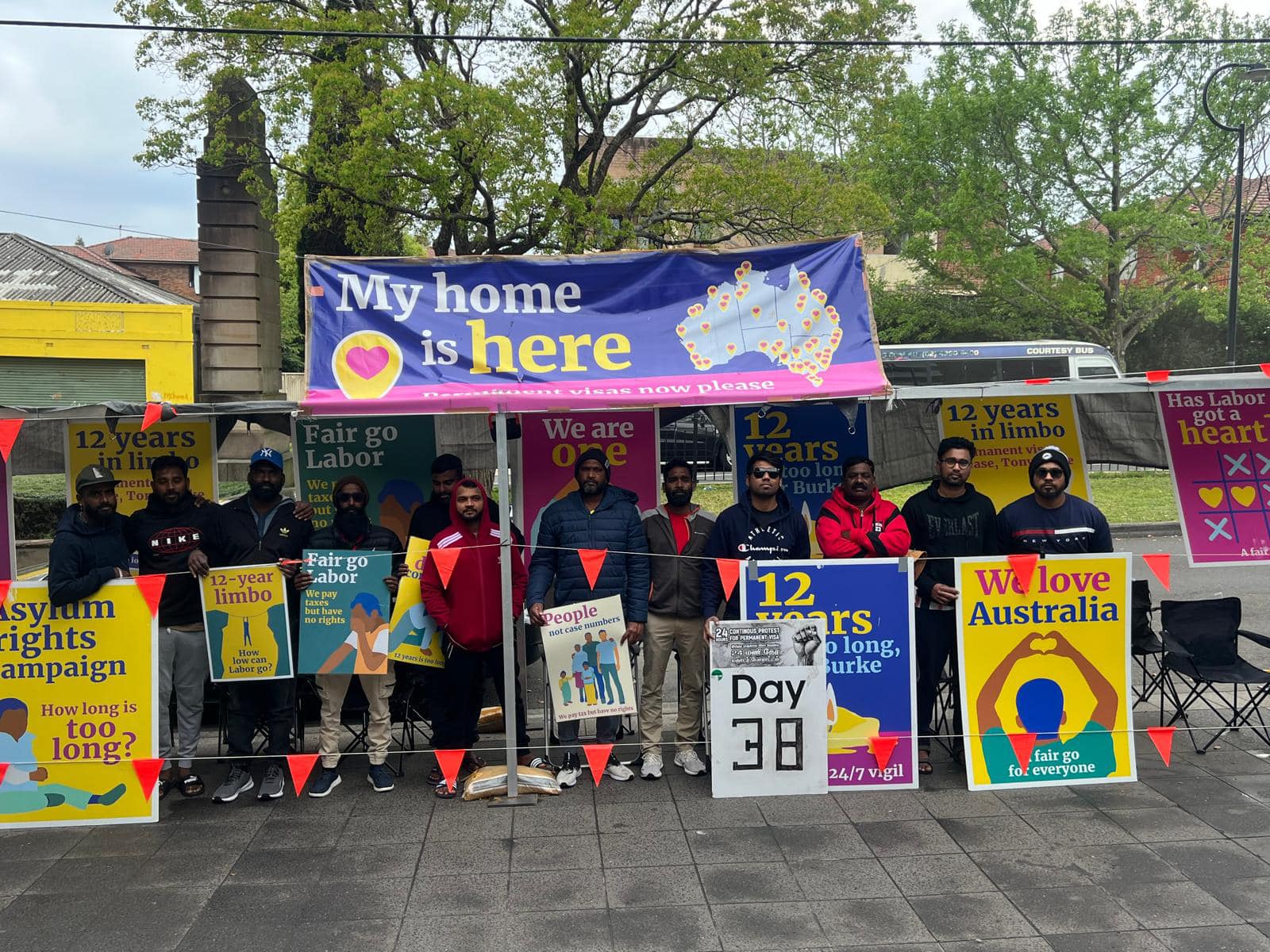
Tamils have been camped outside Australia's Minister for Home Affairs, Tony Burke's office in Sydney for 38 consecutive days demanding the government to grant permanent protection to asylum seekers.
Many Tamils have been seeking asylum in Australia for over 10 years and remain on short term visas which need to be renewed reguarly. Without permanent residency, asylum seekers do not have access to Medicare - Australia’s universal health insurance scheme, they do not have the right to work, study or travel and must report to the visa office every week.
According to the Asylum Seeker Recource Centre, around 8,500 people's cases were rejected under the 'Fast Track' system. This system was introduced in 2014 by the Abbott government and applies to those who sought asylum by sea and arrived in Australia between 13 August 2012 and 31 December 2013.
Tamil asylum seekers who have been stuck in visa limbo for years launched protests across the country with 24 hour encampments running in Melbourne, Perth and Brisbane.
The plight of Tamil asylum seekers
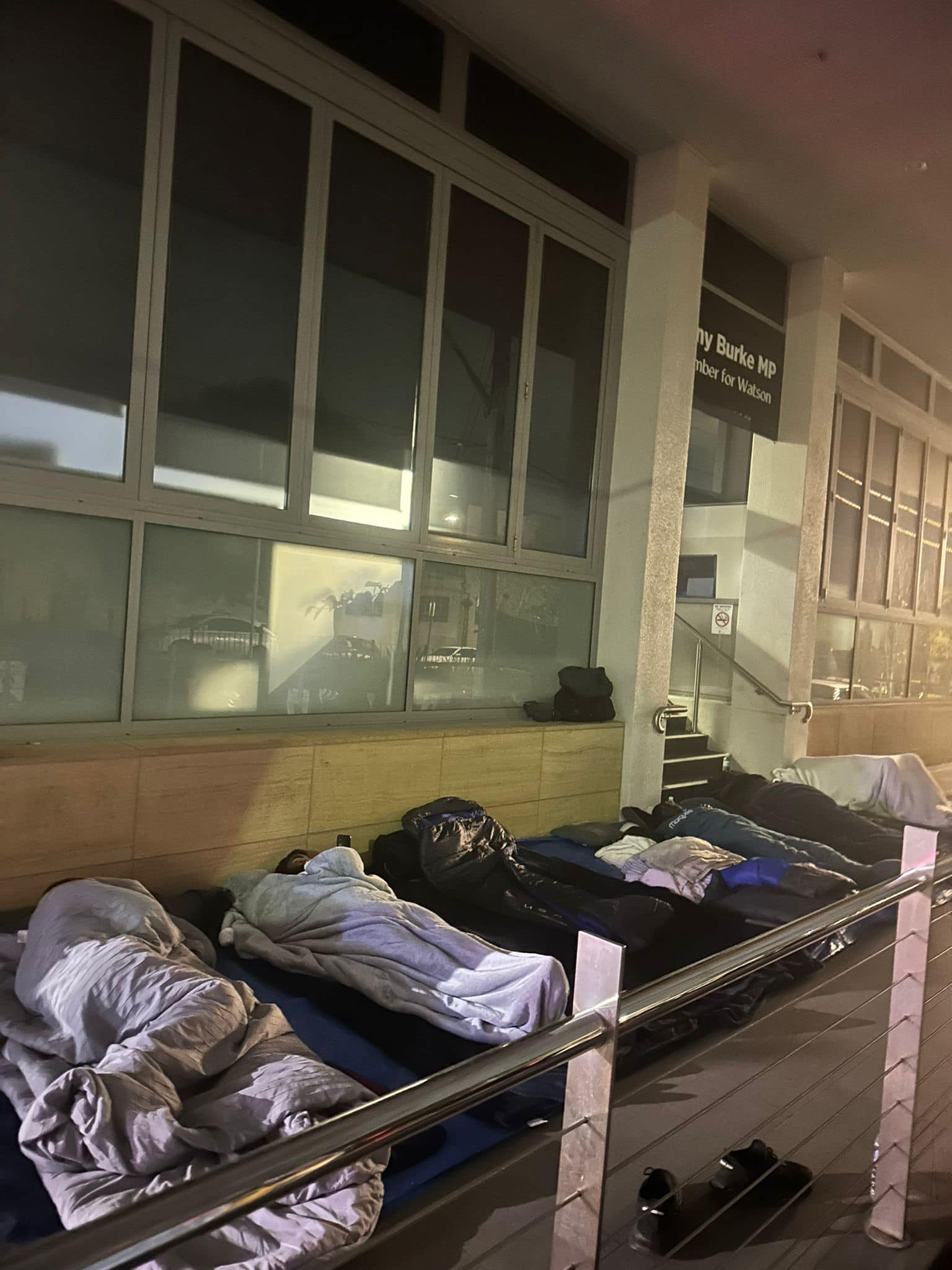
Among those at the Sydney protest site, is Sowriya Vishnuvarman, a 19 year old that fled Sri Lanka with her family. Vishnuvarman, who is on a short term visa, has not be able to pursue university due to visa restrictions.
"My family fled a genocidal campaign by the Sri Lankan state in Tamil Eelam. In 2023, after years of waiting and uncertainty, I was finally accepted into a psychology program at Macquarie University. But just three weeks into my studies, I had to withdraw—not because I wanted to, but because my visa status denied me the opportunity to continue. My pursuit of education, a basic human right, was stolen from me—a direct result of seeking safety from a genocidal regime," Vishnuvarman said.
"This is not just my story. It is the story of many refugees who, like me, are unable to chase their dreams in a country we now call home. We contribute, we strive, but we are treated as outsiders, navigating a system that punishes us for seeking refuge," she added.
Sowriya Vishnuvarman holds a photograph of Mano Yogalingam during a rally
Another Tamil asylum seeker, Abishek Selvakumar arrived in Australia aged seven with his single mother in 2013. Despite living in Australia for over a decade, Selvakumar remains on a bridging visa.
"Like many refugees, we face challenges, stuck on bridging visas, contributing to society but not considered citizens. We want to call Australia home, but legal barriers block our path, making education and future planning difficult. Family separation adds to our pain, leaving many of us longing for reunions," Selvakumar told Tamil Guardian.
"Australia has the chance to lead in global humanitarian efforts by standing with refugees. However, continued interactions with genocidal nations like Sri Lanka raise concerns. The inconsistency between welcoming refugees and the ongoing campaign against those fleeing persecution is confusing. We call for reforms that grant refugees permanent protection, so we can build our futures, reunite with our families, and fully contribute to the country we consider home,” Selvakumar added.
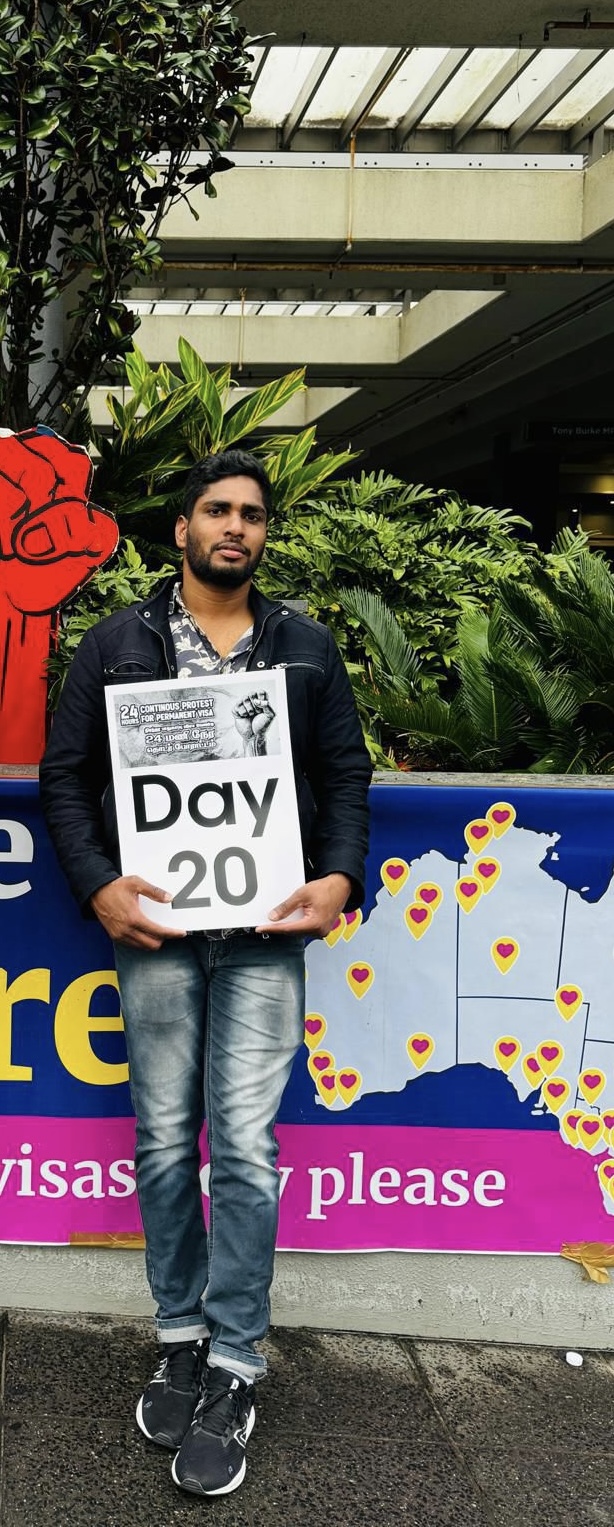
Sutharshan Sunmuham at the encampent site on day 20
Sutharshan Sunmuham told Tamil Guardian that he was "an eyewitness of genocide and saw Eelam Tamils die under the hands of the genocidal Sri Lankan state."
"Now, 13 years later, I remain in limbo with no work rights and an uncertain visa status that jeopardizes my future. Despite contributing to the community, I am denied access to Medicare, which leaves me vulnerable and without basic healthcare. The constant fear of deportation looms over me, exacerbating the challenge of rebuilding my life here, especially for older Eelam Tamils like myself who also grapple with the trauma of our past. We urgently need permanent protection for all refugees to escape this prolonged uncertainty and to live with the stability and dignity we deserve," Sunmuham said.

Photographs of Mano Yogalingam and Sasikaran Selvanayagam - two Tamil asylum seekers who took their own lives due to the uncertainty of their futures in Australia - have been framed at the protest site.
Selvanayagam, a husband and father of three, left his family in Vavuniya and made his way to Australia on August 13, 2012. He took his own life last month after living an isolated life in Australia without any relatives.
Yogalingam, a 23 year told Tamil asylum seeker self-immolated last month after spending years on short term visas. The photographs are a poignant reminder of the realities many Tamil asylum seekers face in Australia.
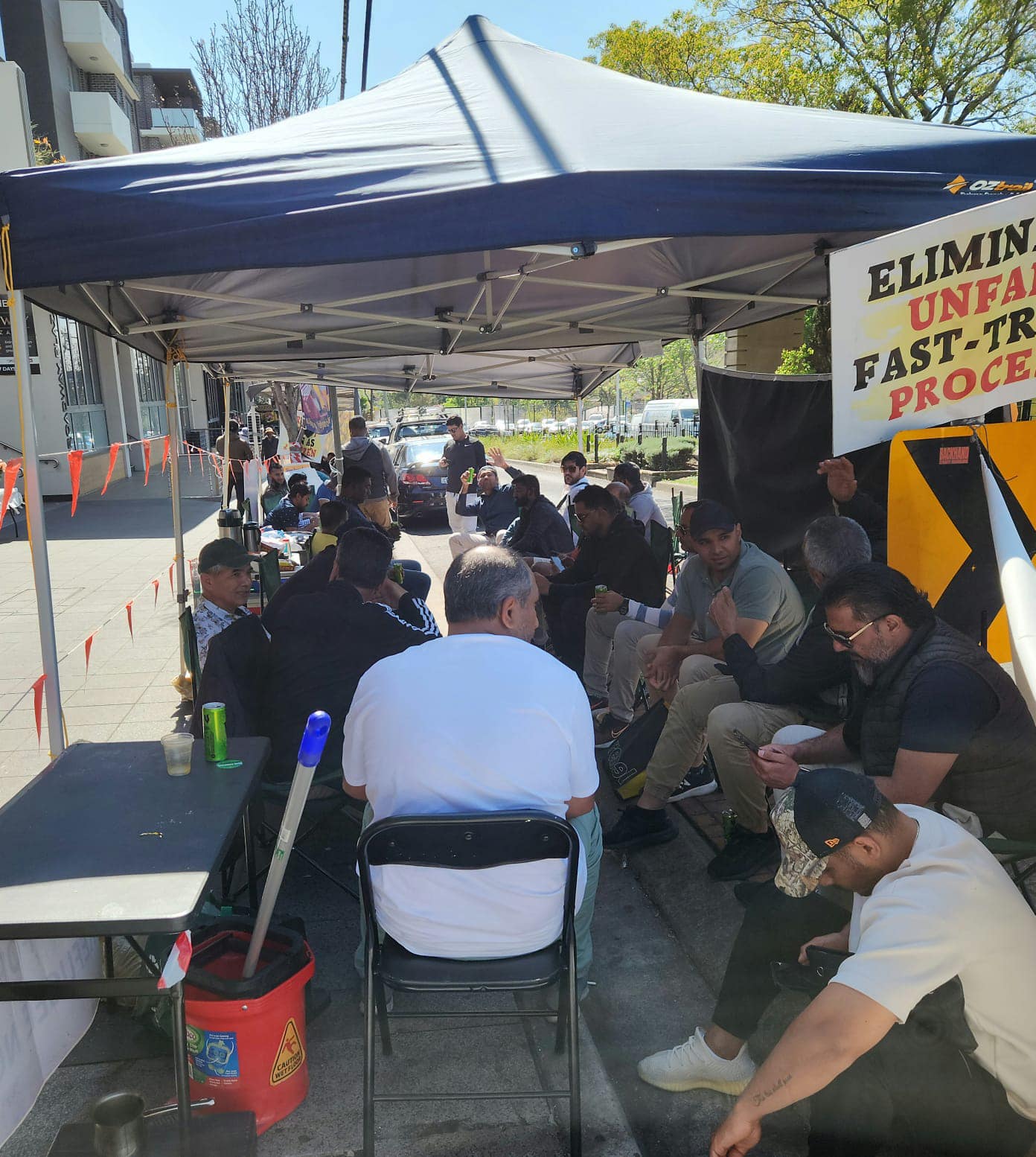
Tamil Refugee Council's spokesperson Renuga Inpakumar told the Tamil Guardian:
"As a citizen, I am witnessing Australian migration laws tear apart the lives of innocent refugees. These laws deny our youth the chance to attend university, to receive the education they deserve, simply because of their visa status. They strip refugees of basic rights like Medicare and the ability to work, pushing them further into the margins. I see the Australian government working alongside genocidal regimes like Sri Lanka, deporting Eelam Tamils back into danger, ignoring the cries of those who have already suffered so much. Other refugee communities live in constant fear, uncertain if they will be next. Yet, these refugees are the backbone of our country, contributing to society while being denied their place within it."
"Refugees have shared their stories, finding in this land a place where they are united for change. They will not stop. We will not stop—until every refugee is granted the permanent protection they deserve, until every life in limbo is given the dignity of security and freedom."
A 'long-standing' partner
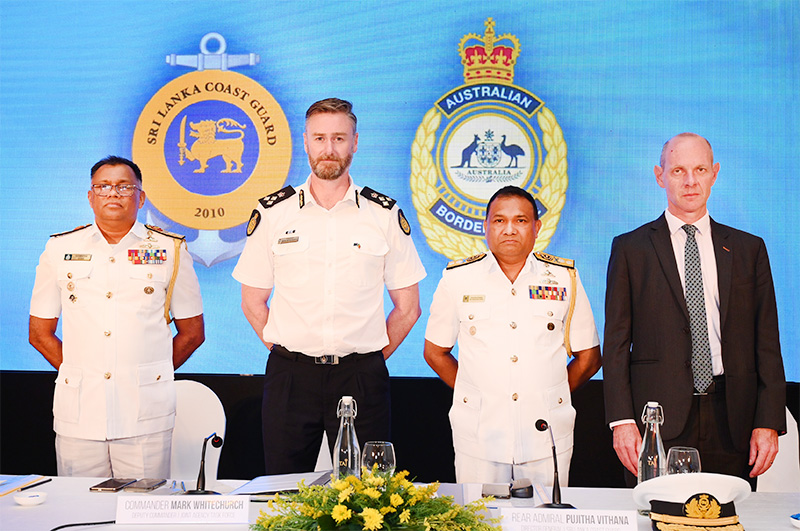
Tamils seeking asylum in Australia fear being deported to Sri Lanka where they face persecution. Australia’s immigration policy has been condemned for years as Tamils continue to flee Sri Lanka as international human rights organisations document ongoing human rights violations and the militarisation of the North-East.
Earlier this year, the Deputy Commander of Joint Agency Task Force Operation Sovereign Borders of Australia, Commander Mark Whitechurch, boasted that not a single boat of asylum seekers looking to leave from Sri Lanka to Australia had been intercepted in over a year.
Last year, the Australian government came under fire after a poster was spotted in Jaffna warning of death if Tamil refugees sought to flee the island for Australia. Images posted on social media show a billboard warning against fleeing to Australia, stating “Don't be in a hurry for your funeral”. “If you are caught, you will perish,” the poster adds, with amangala thoranam leaves in the backdrop. The leaves are traditionally displayed at Tamil funeral homes.
A recent report by the Office of High Commisioner for Human Rights highlighted that sexual violence and intimidation of Tamil activists by Sri Lanka’s security forces continue to this day.
The report details that the OHCHR has received reports, as recent as January 2024, of arbitrary detention, torture, and sexual violence perpetrated against Tamils by Sri Lanka’s security forces, “mainly in Jaffna, Kilinochchi, Mannar, Mullaitivu, and Vavuniya”. They note that a clear pattern emerges of targeting and monitoring Tamils, “primarily men who had been involved in protests over disappearances, land/environmental rights or commemoration of war victims and were believed to be previously involved or linked with the Liberation Tigers of Tamil Eelam (LTTE)”.
The United Nations Human Rights Council (UNHRC) is discussing Sri Lanka at its 57th session in Geneva this week. On Monday, the Council met and spoke on Sri Lanka's human rights situation and the High Commissioner's report.
Australia told the Council that it is a "long-standing partner" of Sri Lanka but said that it recognises the concerns highlighted by the High Commissioner in his report "including on harassment and intimidation of civil society, the erosion of democratic checks and balances, and the introduction of laws which further limit feedom of expression, opinion and association."
Despite reports of ongoing abuses on the island, Australia has continued to deepen its ties with Sri Lanka and it's military that stands accused of a litany of war crimes.

